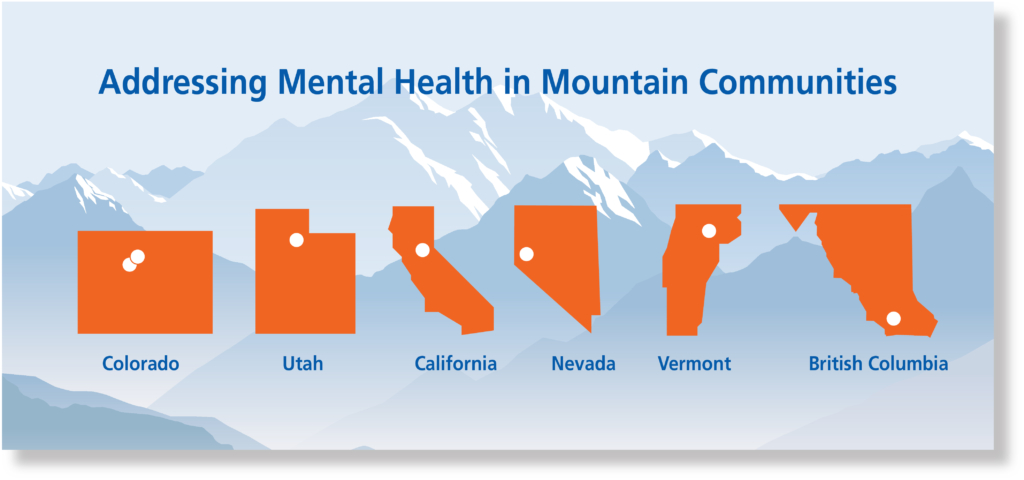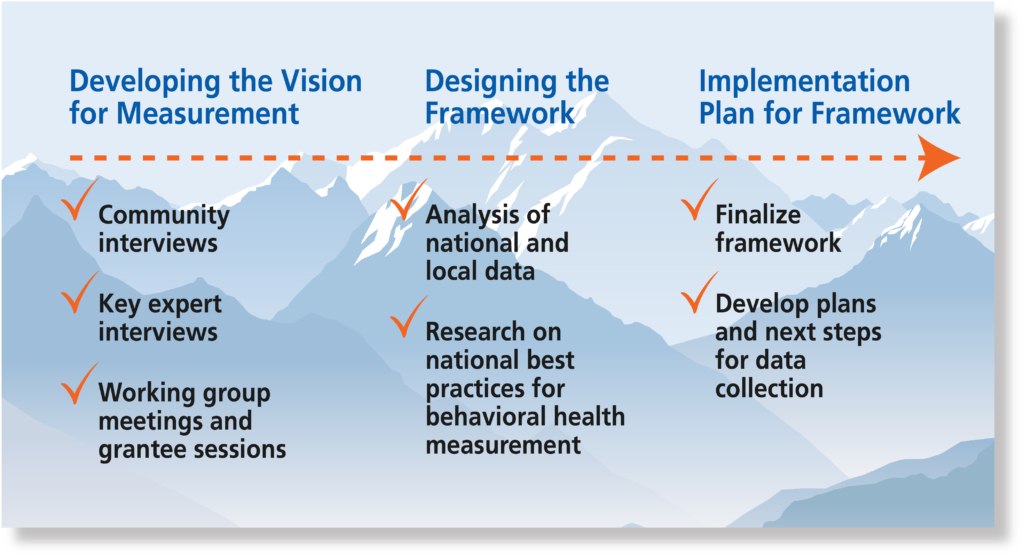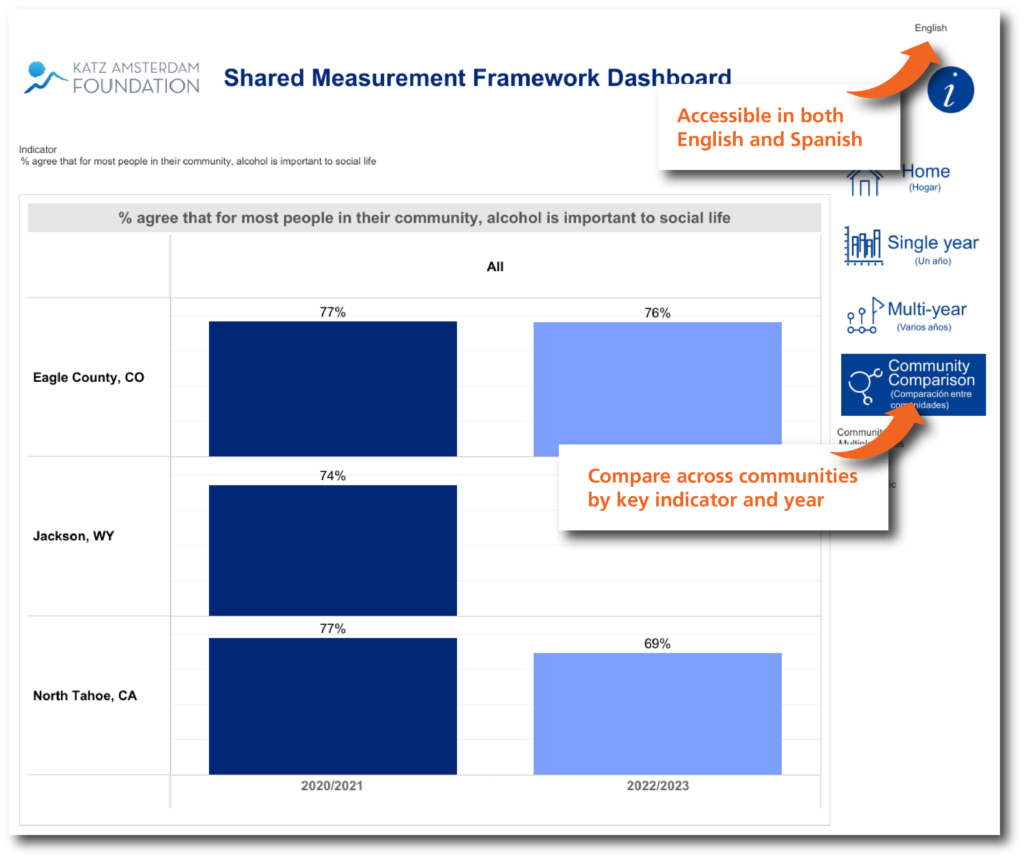
The Katz Amsterdam Foundation (KAF) is connecting organizations addressing mental health in mountain resort communities through shared measurement.
KAF is a family foundation co-founded by Rob Katz, the executive chairperson of Vail Resorts, and Elana Amsterdam, a New York Times best-selling author and founder of Elana’s Pantry. The couple formally launched the Katz Amsterdam Foundation and Charitable Trust in 2018, with a focus area centered on supporting mental health in the mountain resort communities where Vail Resorts operates. As a new foundation, Katz Amsterdam wanted to do more than give out grants; they wanted to take a systems-level approach to improving behavioral health in mountain communities. To do so, KAF formed the Mountain Behavioral Health Network, a community designed to foster grantee learning and collaboration across geographies.
FSG helped facilitate the Mountain Behavioral Health Network’s first convening in 2019, where grantees discussed how key data points on mental health and community well-being were not publicly available for many of the mountain resort communities that they serve. Without a holistic picture of mental health and wellness in each region, grantees found themselves struggling to measure the impact of their activities or build programs that truly addressed community needs.
In response to the concerns voiced by grantees and FSG’s own extensive experience in supporting collective impact approaches, KAF’s Mountain Behavioral Network and FSG began work on a shared measurement framework together. This framework would provide a set of shared indicators on mental health and wellness for each community; grantees could use this individually to understand needs in their own geography and also collectively to collaborate across regions.
Since 2019, FSG has partnered with KAF in a multi-year engagement that has involved developing the shared measurement framework alongside representatives from seven mountain communities, implementing the framework through data collection and data visualization in a public dashboard, and supporting the Mountain Behavioral Health Network’s annual convenings.
The Process

First, the FSG team partnered closely with KAF and a working group of representatives from seven mountain communities to align on shared indicators for mental health and community well-being for the framework. To ensure that the framework was based on national standards as well as local grantee-identified needs, FSG conducted interviews with key experts, funders, and grantees and considered over 200 indicators that are commonly used in national behavioral health surveys.
The final shared measurement framework decided upon by grantees tracks fourteen key indicators, ranging from community belonging to the availability of mental health services. These key indicators are based on five core behavioral health challenges identified in mountain resort communities:
 1. Social Dynamics and Party Culture: Mountain resort communities have unique social dynamics and culture. They have many characteristics of rural communities, but also experience high fluctuations in population throughout the year due to a large seasonal workforce and tourism – making it difficult to establish and maintain the deep social connections that are foundational to community well-being. Additionally, a tourism-based economy often results in a heavy local emphasis on partying and substance use.
1. Social Dynamics and Party Culture: Mountain resort communities have unique social dynamics and culture. They have many characteristics of rural communities, but also experience high fluctuations in population throughout the year due to a large seasonal workforce and tourism – making it difficult to establish and maintain the deep social connections that are foundational to community well-being. Additionally, a tourism-based economy often results in a heavy local emphasis on partying and substance use.
 2. Mental Health Knowledge and Attitudes: Stigma for utilizing mental health services is pervasive across society, but stigma can be intensified due to the lack of anonymity and fear of being recognized when seeking care in small mountain communities. There is also an underlying sense of the “paradise paradox” – a mentality that people living in beautiful vacation destinations should be happy all of the time, and therefore might feel it isn’t acceptable to not be okay and possibly suppress their issues.
2. Mental Health Knowledge and Attitudes: Stigma for utilizing mental health services is pervasive across society, but stigma can be intensified due to the lack of anonymity and fear of being recognized when seeking care in small mountain communities. There is also an underlying sense of the “paradise paradox” – a mentality that people living in beautiful vacation destinations should be happy all of the time, and therefore might feel it isn’t acceptable to not be okay and possibly suppress their issues.
 3. Provider Capacity: The rural nature of many mountain communities creates difficulty in attracting and retaining quality mental health providers. Residents often have to travel long distances to receive care due to local provider shortages. Moreover, populations in mountain communities are becoming increasingly culturally and linguistically diverse, and providers are often unable to offer culturally responsive care for non-English speakers.
3. Provider Capacity: The rural nature of many mountain communities creates difficulty in attracting and retaining quality mental health providers. Residents often have to travel long distances to receive care due to local provider shortages. Moreover, populations in mountain communities are becoming increasingly culturally and linguistically diverse, and providers are often unable to offer culturally responsive care for non-English speakers.
 4. Accessibility and Affordability of Treatment: Due to the limited number of providers in mountain resort communities, people can face long wait times and often have difficulty getting the appropriate type of treatment. Similar to other rural communities, traveling long distances for mental health services can be a challenge, and inclement weather and difficult roads can further compound this issue for mountain communities. The cost of care and finding providers that accept insurance are other prominent barriers to treatment.
4. Accessibility and Affordability of Treatment: Due to the limited number of providers in mountain resort communities, people can face long wait times and often have difficulty getting the appropriate type of treatment. Similar to other rural communities, traveling long distances for mental health services can be a challenge, and inclement weather and difficult roads can further compound this issue for mountain communities. The cost of care and finding providers that accept insurance are other prominent barriers to treatment.
 5. Adverse Behavioral Health Outcomes: The convergence of risk factors for behavioral health challenges in mountain communities often leads to higher rates of substance use and suicide-related deaths. In 2019, binge drinking in mountain communities was 25% higher than the national average, and the reported rate of alcohol-induced deaths was 50% higher than the national average from 2017-2019.
5. Adverse Behavioral Health Outcomes: The convergence of risk factors for behavioral health challenges in mountain communities often leads to higher rates of substance use and suicide-related deaths. In 2019, binge drinking in mountain communities was 25% higher than the national average, and the reported rate of alcohol-induced deaths was 50% higher than the national average from 2017-2019.
The Impact
Ultimately, a framework provides most value when put into practice, and KAF decided to partner with FSG again to support the implementation of the shared measurement framework. When the framework was created, only 38% of the data for priority indicators existed through national and local data sources. However, FSG was able to partner again with KAF communities and a survey research firm, PRC Custom Research, to collect missing data through community and provider surveys in each mountain community. This allowed mountain community behavioral health leaders to have a more complete picture of mental health and wellness for each region in 2020.
KAF also felt strongly that this data should be available publicly to other community-based organizations and individuals beyond the Mountain Behavioral Health Network, and FSG also supported the process of sharing the data through a public-facing dashboard accessible in both English and Spanish. Now, two rounds of the community and provider surveys have been conducted in 2020 and 2022, allowing for multi-year comparison across mountain communities and actionable insights on community well-being and substance use throughout the last few years of the COVID-19 pandemic.
The shared measurement framework dashboard makes key indicators of mental health and community well-being in mountain communities accessible through a public dashboard. Data can be accessed by year, in English and Spanish, and across different geographies and demographics.
Ultimately, the collaborative design of the shared measurement framework can serve as a model for funders looking to build their own grantee learning initiatives. Initially, the key indicators were perceived as another requirement for grantee reporting, but KAF worked hard to build trust with grantees and showcase that the data was simply a resource for helping them do their work better. Most importantly, KAF gave grantees ownership and agency over the process of building the shared measurement framework, and FSG facilitated discussions amongst grantees over decisions such as which key indicators were most pertinent to their communities or which survey research firm to select. This allowed grantees to co-design a tool that was most reflective of the needs of their respective mountain communities and truly empowered them to do their work better. Grantees have used the data to inform strategic decision-making, to target specific programming to sub-populations highlighted by the data, and to raise additional funding for their work.
Having a shared measurement framework and a regular space to connect on their shared challenges is enabling the Mountain Behavioral Health Network to go deeper and deeper into collaboration. For example, a grantee in Eagle County, Colorado has developed a program called Mountain Strong that enables individuals to receive behavioral health services through an employee assistance program (EAP) as well as a scholarship fund. Now, community partners in Park City, Utah are looking to pilot the same model. Similarly, one grantee has developed a 24/7 crisis health support line that others in Summit County, Colorado have emulated in their own community.
Over time, grantees have come to see themselves as part of a wider ecosystem; prior to the creation of the network, many grantees did not know each other and the work being done in communities. Now, the network has become a community that is allowing grantees to collaborate and better serve their respective regions in ways that are enabling improved behavioral health outcomes across geographies.
“FSG has been such a valuable partner for us over the last several years. They are a team of talented facilitators and experienced strategists, and they’re incredibly passionate about our work.”
– Beth Ganz, Executive Director of Katz Amsterdam Foundation
About the Katz Amsterdam Foundation
The Katz Amsterdam Foundation strives to be a catalyst for eliminating inequities, increasing access to opportunity, and improving outcomes for all. We know that everyone benefits from living in healthy and cohesive communities, but access to these benefits is unequal – a result of historical racial and social injustice. We work in partnership with communities to advance just and equitable approaches to accessing mental, behavioral and reproductive healthcare and protecting our civil rights by increasing civic engagement and participation in our multiracial democracy. We do this work by addressing systemic injustice, racial and social disparities in mental health, reproductive health, and well-being. As a foundation, our priority is to support community-driven work that meaningfully improves the lives of all individuals and the social well-being of our communities. For more information, visit www.katzamsterdam.org.







